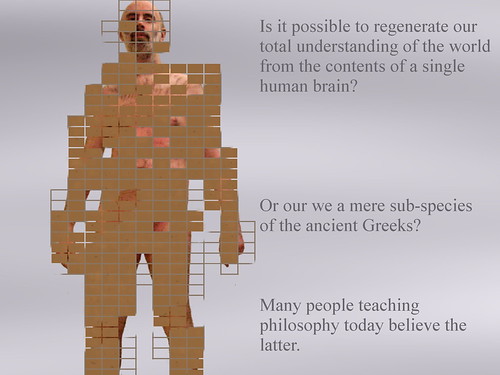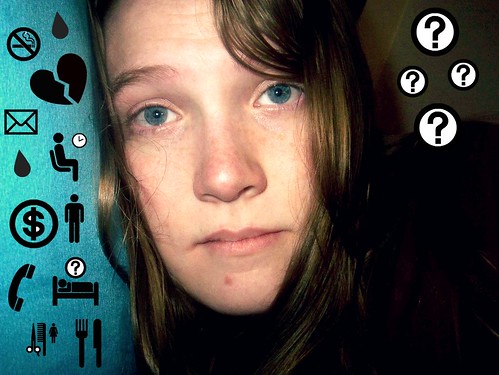I remember Lech Walesa, former president of Poland and leader of Solidarity at the Gdansk shipyards in the 1980s, during an attempted political comeback in about 2000 using the slogan 'black is black, white is white". For all his remarkable efforts with Solidarity, he had made a poor president, which to my mind is no shame, and there were not many people left in Poland who would trust him as their leader by this time. Still, the slogan was a wise move - for there are many people who believe in Right and Wrong, Law and Chaos, etc.
The reality is that Right/Wrong/Law/Chaos/etc are [i]limits[/i] - unattainable concepts of perfect in two opposite directions - infinity and negative infinity.
Thursday, May 21, 2009
037 - D is for unnecessary Division
Sunday, May 17, 2009
035 - L is for Learning
Tools are nothing more than a manifestation of our imaginations, which we choose to use in order to make specific tasks easier or more comprehensible. The guiding force behind the use of all tools, including our own hands, is philosophy, that mental, sharable manifestation of our innermost selves.
Philosophy to many is something divorced from the practical world, something engaged in by lofty intellectuals either while wearing a white sheet and sandals or a tweedy jacket with a pipe hanging from the mouth, ready to be used to point out relevant facts.
Philosophy was once part and parcel of the whole learning thing, but somewhere along the way it lost contact with the sciences and barely remained in anything more than a nodding acquaintance of the arts. Philosophy forgot one of its own - if you step into a river today, then if you step into it tomorrow, it won't be the same river. Philosophy tried to remain the same river, not really noticing that the science had cut a whole new channel of its own.
If philosophers fail to keep in regular enough contact with science and its companion, business, can science and business at least keep an eye on philosophy? The answer is, generally no, because philosphy appears largely irrelevant. I mean, who cares whether the river today is or is not the same as it was yesterday, it's a just river, isn't it?
Actually, no, imagine if instead of a river, the example had been a market. This leads to two thoughts - the fiorst of which is that the market today is not the same as it was yesterday, even though it might not appear to have changed. Business, therefore, must continue to monitor the market day after day to see how it is changing in order to decide when the business must change its prices, products, internal procedures and so on. The second is that by putting your foot in a river, you change the river - and by entering a market, you change the market, either slightly or significantly, depending on how big one's business foot is.
I chose this well known piece of philosophy merely to illustrate a point - and that is philosophy is relevant, it is a special tool for managing our knowledge to relate it to our understanding. River, market, HR, family - the philosophic principal works all over the place, a general tool no different to a screwdriver.
If I were to hand you an unfamiliar tool and asked you to use it, you might be concerned - how is it supposed to be used, and when should one use it? A car is a good example of a special transport tool that you know how it is useful, and that special training will be needed in order to use it. With philosophy, on the other hand, no one thinks twice about needing special training in how to use it, hence most people cannot use it effectively and therefore it must be of little or no use.
I see this process every day - the philosophy of creation, for example, is taken for granted, is consequently done badly when attempted, and then when the result fails to meet expectations, the eventual users are blamed. Often the solution is to take more time at the initiation of the process, and to see the process as trying to find the best-fit solution and not the best-fit tradition to wrap around the process like a tired and over-size suit.
All tools are equal if they are equal to the task, and all tools effect whatever they are used on, even if only for observation. Your image of your own language is affected by the grammar you have been taught in relation to it, if you have learned a foriegn language then you are even more affected by the grammar you have been taught, while your image of an unlearned language is almost completely unaffected because you haven't learned any grammar for it. If you were to assess someone else's writings, then writings in your own language, your school-learned language and your unlearned language would all be different. You assessments would be unreliable, no matter how well trained you are, especially in your school-learned language, your assessment of that one is the least likely to be of any practical use them moment you meet a native. Your assessment of the unlearned language would at least have a chance of being safely curtailed by the lack of any understanding. This is the purpose of philosophy - to give you insight into processes without actually touching the processes with the inevitable changes to the processes, and to predict processes that as yet do not exist.
All tools need practice, and all tools need respect. If you cannot get the desired result with a tool then the4 first place to look for a fault is inside our heads.
Imagine you
Thursday, May 14, 2009
034 (1/52) - S is for Save the Humans
I remember being quite surprised while teaching English to a class of university students here in Lublin, Poland, when one of the students told me there were no more philosophers. I cannot now remember whether this student attended the local state (i.e. former communist) university or the local catholic equivalent. Ah, Lublin - where communist and fascist universities abide peacably side-by-side!
Whichever, I soon discovered that this is a common opinion, philosophers are a thing of the past, people gaining degrees in philosophy these days, including professors, are simply unable to be philosophers. Imagine studying physics and being unable to become an physicist! I would not say this is a majority view, nor do i wish universities to become places of rote learning with carefully proscribed views. But - no philosophers? No dangerously exciting interplay of concepts and reality? Everything consigned to the dry pages of university texts like last summer's pressed flowers?
In my idea of the universe, anyone can be a philosopher as long as one takes the time to ponder life. A beer or two with friends is enough to trigger the philosopher among many of us - the results do not have to stun the world, they merely have to be perceptive. And since life is ever changing, especially those that we have influence over, the need for new philosophy is always with us.
My own philosophy, which like any philosophy can sound a little irrelevant to many, is always practical in the way that a screwdriver is eminently practical once you learn how to use one and can recognise those situations in which it can be used. One would not expect to be able to walk into a tool shop and buy the most complex tool and expect to know how to use it effectively without some experience or training, and yet the world is full of people flippant about the impracticality of philosophic tools they lack the skill to use. I would say that all philosophy is practical, but like physical tools, we do not all have the ability or training to use them or to use them effectively.
Sunday, May 10, 2009
now i lay me down to sleep
Actually, this is not my photo at all, but you can click on it to take it to it's source on flikr, where you can read all the notes she has added to the picture to explain all those symbols down the left-hand side. Anyway, I have blogged it to show my answer to her image. First up is her comment to the picture:
i'm so stressed out. i'm not actually, you know, doing anything about it, like, say, working on any of the assignments, etc, that have me stressed out. because i'm also too apathetic to care. does that make sense? i hope it does, because i feel like i'm going crazy.
i can't take this weather anymore.
And now my answer:
You seem to be up against that old wall of infinity, nothing is simple, nothing readily compartmentalizes itself into easy-to-do tasks you can achieve one after another, everything is there, spread out, intertwined, just there, a seemingly infinite number of things to do in a finite amount of time. Is this what it feels like?
I had this feeling many times, but slowly I began to realize that this wall of infinity is also a wall of opportunity, it doesn't really matter where you start and, more importantly, that wall is feeding you inspiration, like to create this seemingly average photo with a built-in wham from the left hand side images coordinated with hammer blow texts. Would you, I ask myself, have created this high level total piece of work if you had been cruising through life on a dreamboat?
By forcing your thoughts and concerns out of your head and into some other format lets you see yourself and your concerns differently. My choice is to write things on lots of bits of paper, and then after a while review them and shuffle them into new orders to try and see connections between them I had never noticed before, or I take photos and heavily edit them and put them on Flikr, and then blog them. This allows me to pull things off that wall of infinity, process them and then I can look at them and think about each separately.
Funnily enough, it does put some money in the bank - by practicing creativity in this way it gives me practice in seeing things in different ways I can solve problems other people cannot - because they rely on tradition, on learnt knowledge, while I rely on all of me and my experience. Everything relates somewhere, and every year I earn some kind of bonus for solving work problems in new ways. Life is still hard, but it helps to learn your way to using those 'negative' feelings as an opportunity to create.
So-called negativity is a great route to creativity!



